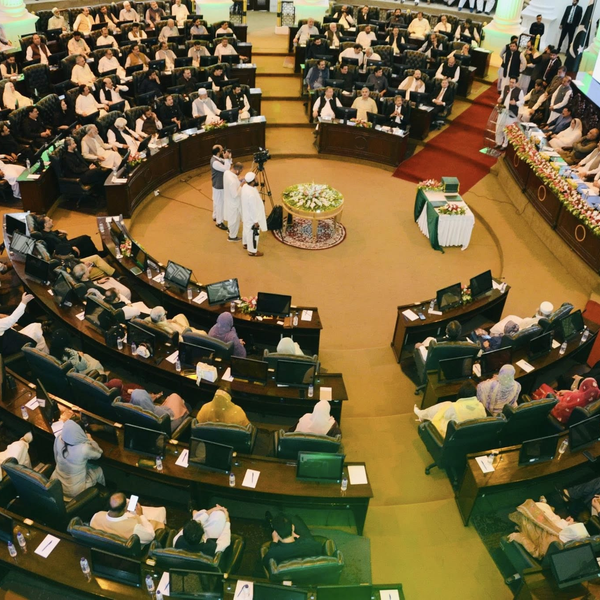Germany's Scholz worried by far-right surge in regional elections
With a year to go until Germany's national election, the results on Sunday punished Scholz's fractious coalition, which could aggravate infighting.
Reuters
News Agency Partner
Reuters is a leading source of news and information, delivering fact-based reporting and expert analysis on international events and trends.

German Chancellor Olaf Scholz from the Social Democratic Party (SPD) speaks on stage during an election campaign rally for the Saxony state elections in Chemnitz, Germany, August 30, 2024.
Reuters
All three parties in federal government appeared to have lost votes in elections in Thuringia and Saxony.
Most likely impact of results to be increased bickering within Scholz's ideologically heterogeneous coalition, according to analysts.
German Chancellor Olaf Scholz called the results of two regional elections that saw big wins for the far-right AfD and losses for his coalition "bitter" and urged mainstream parties to form governments without "right-wing extremists."
The Alternative for Germany (AfD) became the first far-right party to win a state legislature election in Germany since World War II, securing 33.2% in Thuringia in its first regional election. It came a close second behind the conservatives in Saxony, projections late on Sunday showed.
All three parties in the federal government appeared to have lost votes in the elections in Thuringia and Saxony, according to early projections, which underscored the demise of Scholz's Social Democrats (SPD) as a big-tent party. The projections by pollster Forschungsgruppe Wahlen, published at 9 p.m. (1900 GMT), put it at just 6-7.6% of the vote.
Junior coalition partners, the Greens and pro-business Free Democrats, were at risk of being evicted from the Thuringia state parliament for failing to meet the 5% threshold.
Analysts said the most likely impact of the results would be increased bickering within Scholz's ideologically heterogeneous coalition.
"For us, it's going to be about asserting ourselves more strongly," Kevin Kuehnert, SPD party general secretary, said late on Sunday.
"Not letting ourselves be led by the nose by parties that have just been kicked out of a state parliament." The results reflected the growing fragmentation of the political landscape and the rise of anti-establishment parties across Europe as governments have struggled to deal with crises including the Ukraine war and inflation.
The AfD, deemed "right-wing extremist" by security officials in both of the East German states, is unlikely to be able to govern as other parties have so far refused to collaborate with it to form a majority.
Still, the nationalist, anti-migration, and Russia-friendly party could end up with enough seats in both states to block decisions requiring a two-thirds majority, such as the appointment of judges or top security officials, giving it unprecedented power.
With only a year to go before a national election in Europe’s largest economy, Sunday’s results look set to increase the pressure on Scholz to be tougher on immigration and intensify the debate over support for Ukraine, as these issues dominated campaigning.
The German government’s faltering authority could also complicate European policy when the bloc’s other major power, neighboring France, is still struggling to form a government after snap elections in June and July.
"The results for the AfD in Saxony and Thuringia are worrying," Scholz said in a statement to Reuters. He clarified he was speaking as a lawmaker for his center-left SPD.
"Our country cannot and must not get used to this. The AfD is damaging Germany. It is weakening the economy, dividing society, and ruining our country's reputation."
Junior coalition partners the Greens and pro-business Free Democrats both fell out of the Thuringia state assembly.

Reduced support for Ukraine?
The coalition partners, in government since 2021, were at odds even before the elections, as tensions had erupted late last year over the budget for this year and next year.
Their union was originally billed as a coalition of progress, but Greens co-leader Omid Nouripour last month called it a "transitional government," bemoaning the "many, many superfluous disputes" as well as fundamental ideological differences, in particular with the FDP.
FDP deputy leader Wolfgang Kubicki said on Sunday the election results showed the coalition had "lost its legitimacy" and was harming his party, which must have consequences.
"With the 2025 budget bill still featuring a gap of some 12 billion euros ($13.25 billion), renewed coalition tensions are likely," said Carsten Nickel at Teneo in a research note.
Yet Scholz's coalition is unlikely to disband altogether as it is not in the interests of the three parties, which are all polling below their 2021 results, said Stefan Marschall, a political scientist at the University of Duesseldorf.
Both the BSW and AfD have eroded their support, which has led mainstream parties to toughen their stance on migration and could undermine support for Ukraine.
"The issue will become more fraught, and Germany will likely become more paralyzed, meaning others like Poland, France, and Italy will need to set the pace," said Alexander Clarkson at King's College London.
The creation of the BSW and its legitimization in this vote could prove particularly damaging for the SPD, which has already lost more than a third of its supporters since 2021 to poll around 16%, and could see more left-leaning voters drawn away.
Tricky coalition building
The votes will likely also foment a debate about the knock-on effect of uneasy coalitions. With the AfD unable to form a majority, it will be up to the runner-up, the conservatives — but in Thuringia, they will be unable to form a majority without support from the BSW, despite major ideological differences.
That is likely to have an impact in the Bundesrat upper house of parliament too, said Marschall, where state governments are represented, affecting national policy-making.
Meanwhile, coalitions with either the BSW or AfD at the federal level are unthinkable given their foreign policy views. This means the stronger they get, the more the mainstream parties will struggle to form coherent governing majorities, said Andre Brodocz, a political scientist at Erfurt University.
But voters could punish mainstream parties for their incoherent coalitions by voting even more for anti-establishment parties in subsequent elections, analysts say.
"If there is no political implementation, no real changes, no reforms, voters can say the political process has been hijacked by the elites," said political scientist Oliver Lembcke at the University of Bochum. "It's a vicious circle."










Comments
See what people are discussing